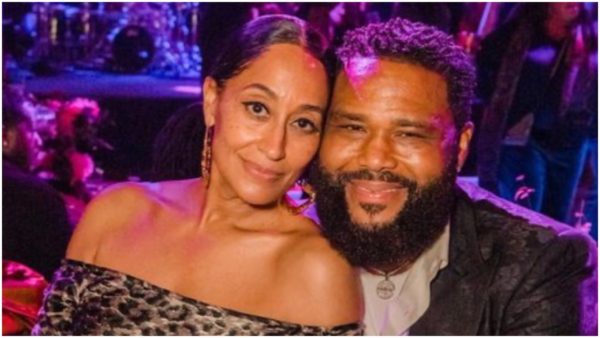Actress Tracee Ellis Ross knew when she took on the role as Rainbow “Bow” Johnson on ABC’s “Black-ish” that she had an opportunity to control how women in relationships were viewed.
In a round table discussion with fellow comedic actresses, Ross broke down exactly why using Bow as “wife wallpaper” — in other words, another repeated depiction of women who only exist within the construct of their relationship and gender — was never an option for her.

“I think particularly on ‘Black-ish’ because the story is not told through — it’s told through Dre’s eyes, I’m just not really interested in playing somebody who’s only a person in relationship to somebody else,” explained Ross during the discussion orchestrated by The Hollywood Reporter.
On the show in which Ross starred opposite of Anthony Anderson, she portrays a mother of five children who also has a thriving career as a anesthesiologist. Throughout the show’s eight seasons Bow often touted her education and career as something that gave her an added edge over her husband, Andre “Dre” Johnson, who worked in advertising.
“That was really important to me from the beginning. It was written in there, but then as the show progressed I just — it’s always important to me that there is a sense of who I am off-screen, and inadvertently, often — I know we’ve probably all heard this: doing lady chores. Like, somehow inadvertently I would be there cooking when he came home from work, I would be chopping, or I would have laundry,” she continued. So, instead of allowing mundane gender-oriented tasks become the norm for her character, Ross said she spoke out.
“I would always say ‘Can I just have a computer?’ ‘Can we flip it? Can I be coming home from work and can Dre be chopping?’ Cause I like to look at things as not just in terms of the character in the scene, but then in the larger cannon of television, and who a woman is on TV, and then a Black woman is on TV,” she added. “I think it’s really important to continue — I think we all know, I mean you just said it — but the images and what culture creates, we know culture influences policy, but it also expands how we see ourselves and how others see us and there’s so many unconscious messages about who we are as women, and particularly Black women.”
During its run on television the show racked up nominations and wins for NAACP Image Awards. Show creator Kenya Barris has previously shared that “Black-ish” and its depiction of the Black family unit was a missing and much needed element of the television landscape.
“This show has changed my life in so many ways and I am so proud of the conversations we’ve started along the way,” he wrote when announcing the hit series would end in 2022. “None of this would have been possible without our audience and supporters, who have championed the show every step of the journey; allowing us to change not just the narrative of Black Families, but of Family, Culture, and the World in general.”
As the show approached its final episodes, which aired in April, Ross publicly spoke about the bittersweet experience of saying farewell. “I was just talking to everybody and hearing their experience in the eight years and what about it was so special for them, because we’ve been the same family for eight years, most of our crew is the same and everything’s so very emotional.”
Her TV husband shared that he too was taken aback by the emotions he felt despite his best efforts to maintain his composure. “I had been prepping myself for it, and in the last scene on the last day is when I lost it, and it was unexpected for me,” said Anderson while appearing on “The Ellen Degeneres Show.”
“I didn’t expect to lose it the way that I did, but that just goes to show how much I love what I do [and] love doing it with the people that I did it with for the last eight years,” Anderson added.


